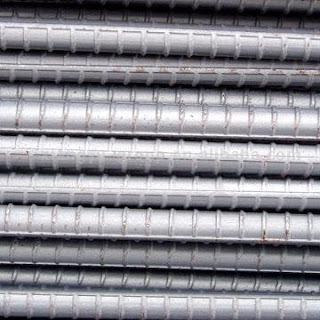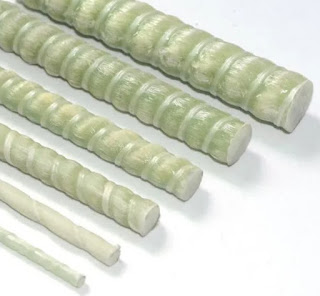Search This Blog
Most Popular
Categories
- Building Construction (87)
- Building Materials (88)
- Columns (2)
- Concrete Beam (3)
- Concrete Construction Techniques (6)
- Concrete Mix Design (15)
- Concrete Repair (14)
- Concrete Slab (11)
- Construction Equipment (17)
- Construction News (7)
- Design of Structures (20)
- Engineering Drawing (1)
- Estimation (3)
- Geotechnical engineering (26)
- Highway Engineering (11)
- Innovations (34)
- Material Testing (11)
- Matrix Analysis of Structures (2)
- Mechanical Engineering (3)
- Strength of Materials (2)
- Structural Analysis (13)
- Structural Design (24)
- Structures (17)
- Transportation Engineering (9)
Rebars in Construction | Types & Grades of Reinforcement Bars
 |
| Figure-1 |
Rebars used for concrete can be plain or deformed. Compared to plain rebars, deformed patterns on the reinforcement bars help the concrete adhere or bond to the reinforcing steel surface without slipping and together sustain tensile stress.
Plain and deformed rebars can be made of steel or fiber. The type of rebar is selected based on the material and properties suitable for the construction application.
Plain and Deformed Reinforcement Bars
1. Mild Steel Rebars
|
Types of nominal size of bars |
Ultimate Tensile Stress N/mm2 minimum |
Yield Stress N/mm2 |
Elongation Percent minimum |
|
Mild Steel Grade I or Grade 60 |
|||
|
For bars up to 20mm |
410 |
250 |
23 |
|
For bars above 20mm upto 50 mm |
410 |
240 |
23 |
|
Mild Steel Grade-II or Grade 40 |
|||
|
For barbars to 20mm |
370 |
225 |
23 |
|
For bars above 20mm up to 50 mm |
370 |
215 |
23 |
|
Medium Tensile Steel Grade-75 |
|||
|
for bars up to 16mm |
540 |
350 |
20 |
|
for bars above 16 mm up to 32
mm |
540 |
340 |
20 |
|
for bars above 32 mm up to 50 mm |
510 |
330 |
20 |
2. Carbon Steel Rebars
|
Grade |
GRADE
40 |
GRADE
60 |
GRADE
75 |
GRADE
80 |
|
Minimum
Yield Strength (psi) |
40,000 |
60,000 |
75,000 |
80,000 |
|
Minimum
Yield Strength (MPa) |
280 |
420 |
520 |
550 |
3. Low-Alloy Steel Rebars
|
Grade |
GRADE
60 |
GRADE
80 |
|
Minimum Yield Strength (psi) |
60,000 |
80,000 |
|
Minimum Yield Strength (MPa) |
420 |
550 |
4. HYSD Rebars
As per Clause 8.1 (Table 3) of IS: 1786-2008
|
Property |
Fe 415 |
Fe 415D |
Fe 500 |
Fe 500D |
Fe 550 |
Fe 550D |
Fe 600 |
|
Yield Stress |
415 |
415 |
500 |
500 |
550 |
550 |
600 |
|
Ultimate Tensile Stress |
10 percent more than the actual 0.2 percent proof stress/ yield stress
but not less than 485.0 N/mm2 |
12 percent more than the actual 0.2 percent proof stress/ yield stress
but not less than 500 N/mm2 |
8 percent more than the actual 0.2 percent proof stress/ yield stress
but not less than 545 N/mm2 |
10 percent more than the actual 0.2 percent proof stress/ yield stress
but not less than 565 N/mm2 |
6 percent more than the actual 0.2 percent proof stress/ yield stress
but not less than 585 N/mm2 |
8 percent more than the actual 0.2 percent proof stress/ yield stress
but not less than 600 N/mm2 |
6 percent more than the actual 0.2 percent proof stress/ yield stress
but not less than 660 N/mm2 |
|
Elongation (%) |
14.5 |
18 |
12 |
16 |
10 |
14.5 |
10 |
HYSD bars can be classified into cold twisted deformed bars (CTD bars), thermo mechanically twisted bars (TMT bars), and corrosion-resistant bars (CRS).
4.1. Cold Twisted Deformed (CTD) Bars
4.2. Thermo Mechanically Treated (TMT) Bars
4.3. Corrosion Resistant Bars (CRS)
5. Stainless Steel Rebars (SSR)
Stainless steel is the name given to a group of corrosion-resistant steel alloys that contain a minimum of 10.5% chromium. Stainless steel reinforcement is made of unalloyed steel which won't show any kind of corrosion and rust forming that is noticeable in normal environmental conditions. There are two main codes and standards today that incorporate the SSR. They are:- The British Standard BS6744
- The American Standard ASTM A955
Table-4: Tensile Requirements for Stainless Steel Rebars ATM A955
Property
GRADE 40
GRADE 60
GRADE 75
Tensile
Strength
psi[MPa]
70000 [500]
90,000[620]
100,00 [690]
Yield Strength
psi [MPa]
40,000[280]
60,000[420]
75,000[520]
The ASTM A955/A955M Standard Specification for Deformed and Plain Stainless-Steel Bars for Concrete Reinforcement. The bars are of three minimum yield strength levels namely Grade 40, Grade 60, and Grade 75, whose properties are given in Table-4. It is the main Standard for stainless steel rebar in the USA and Canada.
|
Property |
GRADE 40 |
GRADE 60 |
GRADE 75 |
|
Tensile
Strength psi[MPa] |
70000 [500] |
90,000[620] |
100,00 [690] |
|
Yield Strength psi [MPa] |
40,000[280] |
60,000[420] |
75,000[520] |
6. Epoxy-Coated Rebars
7. Galvanized Rebars
8. Low-Carbon Chromium Bars
|
Type |
A1035 CL |
A1035 CM |
A1035 CS |
|||
|
Grade |
Grade 100 [690] |
Grade 120 [830] |
Grade 100 [690] |
Grade 120 [830] |
Grade 100 [690] |
Grade 120 [830] |
|
Tensile Strength,
min, psi |
150,000 |
150,000 |
150,000 |
150,000 |
150,000 |
150,000 |
|
[MPa] |
[1030] |
[1030] |
[1030] |
[1030] |
[1030] |
[1030] |
|
Yield Strength
(0.2% offset), min, psi [MPa] |
100,000 [690] |
120,000 [830] |
100,000 [690] |
120,000 [830] |
100,000 [690] |
120,000 [830] |
|
Elongation in 8
in.[200 mm], min |
||||||
|
Bar Designation No.3 through 11 [10 through 36]14, 18, 20 [43, 57, 64] |
||||||
|
7 |
7 |
7 |
7 |
7 |
7 |
|
|
6 |
6 |
6 |
6 |
6 |
6 |
|
9. Rail and Axle Steel Bars
ASTM A996/A996M-16, is the Standard Specification for Rail-Steel and Axle-Steel Deformed Bars for Concrete Reinforcement. Three types of products are included, designated with a “rail symbol,” an “R” for bars made of rail steel, and an “A” for bars made of axle steel.|
Property |
Type
R Rail
Steel Bars |
Type
A Axle
Steel Bars |
||
|
Grade 50 |
Grade 60 |
Grade 40 |
Grade 60 |
|
|
Tensile
Strength, Min, psi [MPa] |
80,000 [550] |
90,000 [620] |
70,000[500] |
90,000 [620] |
|
Yield Strength, Min, psi [MPa] |
50,000 [350] |
60,000 [420] |
40,000[280] |
60,000 [420] |
The bars shall be rolled from standard section Tee rails or from carbon steel axles for railway cars and locomotives.
10. Fiber-Reinforcing Polymer (FRP) Rebars
|
Steel |
GFRP |
CFRP |
AFRP |
|
|
Nominal
yield stress, ksi (MPa) |
40 to
75 (276 to
517) |
NA |
NA |
NA |
|
Tensile
strength, ksi (MPa) |
70 to
100 (483 to
1600) |
70 to
230 (483 to
690) |
87 to
535 (600 to
3690) |
250 to
368 (1720
to 2540) |
|
Elastic
modulus, x 103 ksi (GPa) |
29.0 (200.0) |
5.1 to
7.4 (35.0
to 51.0) |
15.9 to
84.0 (120.0
to 580.0) |
6.0 to
18.2 (41.0
to 125.0) |
|
Yield
strain, percent |
0.14 to
0.25 |
NA |
NA |
NA |
|
Rupture
strain, percent |
6.0 to
12.0 |
1.2 to
3.1 |
0.5 to
1.7 |
1.9 to
4.4 |








0 Comments
Commenting Spam Links Are Against Policies